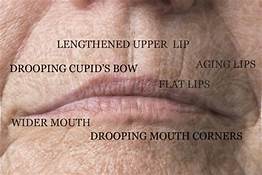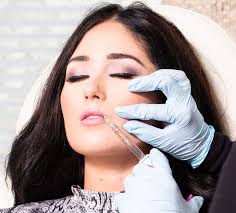
As time passes and we grow older, the shape of our lips and its border fades gradually, the lips become thin, and fine lines start to occur. While this can make you uncomfortable with your looks, there is a solution.

Whether you are concerned about aging lips or thin lips, or you are looking for a more sumptuous lip appearance, injectable lip fillers can effectively and safely help you obtain a beautiful and enhanced lip appearance. Lips play an important role in your overall facial structure and convey youthfulness, healthiness, and attractiveness. But with age, your lips will lose volume and can appear smaller, dry, and wrinkled.

Lip fillers such as Restylane and Juvederm may help restore your natural lip volume and give your lips a smooth texture and more balanced look. They may also be used to enhance your lip volume or boost the contour of your lips so that they can have improved proportion and symmetry.

Issues Lip Fillers Treat:
• Signs of aging
Injectable lip fillers can help balance the appearance around your lips, giving them a youthful, firmer appearance by removing lines and wrinkles. Wrinkles in the lips can be caused by a wide range of factors including smoking, repetitive smiling, or frequent pursing of lips. Lip fillers are an effective solution for temporarily reversing these effects.
• Thin lips: Dermal fillers are known for being among the best possible options for treating thin lips. This procedure will add plumpness to your lips and give you a more youthful appearance. Without proper technique, it is safe and effective. The filler products are available in a variety of options, including but not limited to Restylane and Juvederm. Note that you cannot administer these products by yourself. Always work with a trained and qualified medical professional.

• Smoker’s wrinkles: If you are a smoker, please quit. If that is not feasible for you at this time, and if you have severe wrinkles around your lips, injectable lip fillers may help to temporarily remove the lines. Dermal fillers have ingredients such as hyaluronic acid, which help plump up the targeted area of skin to smooth out the wrinkles. Benefits of Lip Fillers
• Injections may be reversible Some injectable lip fillers may be reversed if you are not completely satisfied with the final results. Hyaluronic acid fillers may be reversed; so if you are currently on the fence about undergoing this procedure, you should cast your doubts aside because you may have the filler dissolved. Hyaluronic acid can be broken down by the hyaluronidase enzyme, removing the fillers in the process.
• Minimal down-time
Hyaluronic acid (HA) is produced in the body naturally. As a result, fillers based in HA may reduce the risk of the side effect of rejection of the injectable lip filler. Prior to undergoing an injectable procedure, Dr. Madhere will review your medical history during a thorough initial consultation (in-person, virtually, or online via Click-lift.com) to help determine if ou are a suitable candidate for a filler.

• Results in real time Generally, the procedure for undergoing injectable lip fillers may take up to 30 minutes, including the use of numbing medication. Results are usually visible at the end of the procedure, but may need minor refinement in the 1-2 weeks after any minor swelling has resolved.
• Natural-looking results
The results of injectable lip fillers can be natural-looking and subtle. Based on the condition of your lips, Dr. Madhere will determine how much volume is required in order to have your desired results. Before you undergo a filler procedure, it is important to discuss with your doctor what is possible for your lips and what you may anticipate after the procedure. About Lip Fillers Non-surgical lip filler procedures or lip augmentation is performed with the aim of giving the patient fuller, plumper lips.
The most common type of non-surgical lip augmentation uses injectable dermal fillers, which are available in a variety of brands. When it comes to injectable lip fillers, the most common ingredient in most products is hyaluronic acid, a natural substance found in the body that when injected, increases the volume of your lips. These types of injectable fillers are sometimes known as hyaluronic acid fillers.
Other methods of lip fillers include implants and fat injections. These are surgical procedures that are more involved than using injectable fillers.

How Injectable Lip Fillers Work:
Lip fillers are made with ingredients such as hyaluronic acid, a naturally occurring substance that is attributed to locking moisture into the skin. Some lip fillers also contain the numbing medication lidocaine, along with the filler itself, thus leading to a painless procedure. The fillers that Dr. Madhere uses have been FDA-approved, highly rated by patients, and shown to be proven to be effective treatments for boosting the appearance of a patient's lips that might otherwise have wrinkles or appear too thin. Injectable Lip Fillers
FAQs:
Q: What should I expect during my injectable lip filler procedure?
A: Dermal filler involves the injection of a sterile product into the lip areas to add volume. The lips are then shaped to give them improved shape, contour, and definition. Depending upon the amount of correction or enhancement you are seeking, the procedure may take up to 30 minutes and may require minor additional modifications at another office visit.
Q: What should I expect after my injectable lip filler procedure?
A: The recovery of lip filler surgery depends on the technique used to complete the process. Injectable fillers are known for being the least invasive methods and require little to no recovery time. You should expect some degree of swelling, possible mild bruising, and minimal to no discomfort after the numbing medication wears off. These effects are short-lived and may resolve sooner with proper post-procedure care.

Q: Will I have scars from injectable lip fillers?
A: With injectable lip fillers, there are no scars. However, as with any medical or surgical procedure, there are risks, limitations, and potential complications that should be discussed with your physician and understood and consented to by you before undergoing any procedure.